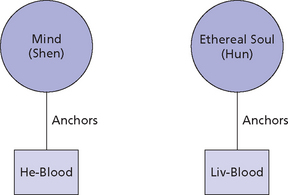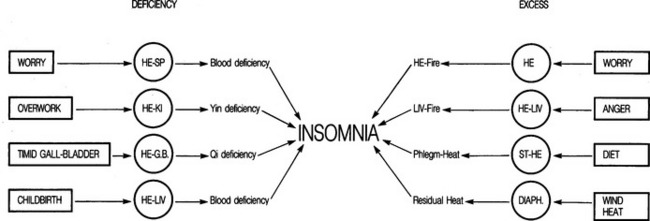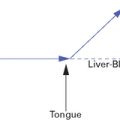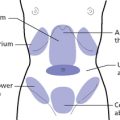 SLEEP
SLEEP
HOW WE ASK
It is important to be specific when asking about sleep and dreaming; it will not suffice to ask ‘Do you sleep well?’ I generally ask patients whether they fall asleep easily, whether they wake up during the night and whether they dream excessively. The last symptom is difficult to define as we all dream: dreaming seems to be an essential part of sleep, performing a function that is still the subject of debate and disagreement. What, therefore, constitutes ‘excessive’ dreaming in Chinese medicine? I personally think this can be defined either as having many dreams, to the point of feeling exhausted in the morning because of them, or as having unpleasant dreams which leave one tired and slightly disturbed in the morning or even wake one up during the night.
If the patient dreams excessively, I then ask whether there is any recurrent dream. Apart from a modern psychological interpretation of dreams according to the theories of Freud, Jung and others, I always try to interpret recurrent dreams in terms of Chinese medicine. The ‘Simple Questions’ has a long list of dreams with their significance in Chinese medicine and these are listed in Part 5, Chapter 81. For example, recurrent dreams of water usually indicate a Kidney deficiency (while in Jungian psychology water is a symbol of the unconscious).
INSOMNIA
Symptoms and Signs, Chapter 81
In general, sleep depends on the state of Blood and Yin, especially of the Heart and Liver, although the Blood and Yin of other organs also influences sleep. During the night Yin energy predominates and the Mind and the Ethereal Soul should be anchored in the Heart-Blood and Liver-Blood respectively (Fig 40.1).
A sleep disturbance may be due to the Mind or the Ethereal Soul not being anchored in the Heart-Blood(or Heart-Yin) or the Liver-Blood (or Liver-Yin) respectively; this can happen either because there is not enough Blood or Yin to anchor the Mind or the Ethereal Soul, or both, or because a pathogenic factor (such as Heat) agitates them. The former is an Empty type of sleep disturbance, the latter a Full type. In both cases, the Mind or the Ethereal Soul is said to ‘float’ at night causing insomnia (Fig 40.2).
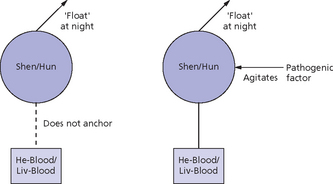
Fig. 40.2 Pathology of insomnia
However, the Heart and Liver are not the only organs that may cause insomnia: the Stomach, Spleen, Kidneys and Gall-Bladder may all play a role in insomnia. For example, a deficiency of Spleen-Blood often accompanies a deficiency of Heart-Blood and contributes to causing insomnia (the famous formula Gui Pi Tang Tonifying the Spleen Decoction treats insomnia from these patterns). Kidney-Yin, like Liver-Yin, also needs to anchor the Mind and the Ethereal Soul at night; therefore a deficiency of Kidney-Yin, with or without Empty-Heat, is also a frequent cause of insomnia.
For a detailed description of the patterns causing insomnia see Part 5, Chapter 81. Figure 40.3 illustrates the aetiology and pathology of insomnia differentiated into the main Empty and Full patterns.
The main patterns appearing in insomnia are summarized in Box 40.1.
EXCESSIVE DREAMING
Symptoms and Signs, Chapter 81
The main patterns causing excessive dreaming are summarized in Box 40.2.
SOMNOLENCE
Interrogation, Chapter 44; Symptoms and Signs, Chapter 81.
Of course, when a patient complains of somnolence, one should first of all enquire about the patient’s working hours: if the person works very long hours (a very common occurrence in Western industrializedsocieties) then somnolence is not a pathological symptom.
For a detailed description of the patterns causing somnolence, see Part 5, Chapter 81.
Box 40.3 summarizes the patterns underlying somnolence.

